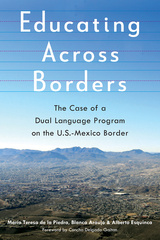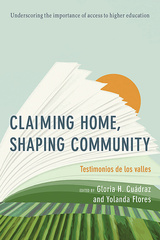Learning the Possible
Mexican American Students Moving from the Margins of Life to New Ways of Being
By Reynaldo Reyes; Foreword by Christian J. Faltis
The University of Arizona Press
Learning the Possible demonstrates that it is truly possible for underprepared high school graduates to be successful in college. It chronicles the struggles and triumphs of five Mexican American students in their first year of college, aided by a one-year scholarship and support program called the College Assistance Migrant Program. CAMP, a federally funded program, is designed to help college students from migrant and/or economically disadvantaged families complete their first year of college. CAMP’s principal objective is to put students on a trajectory toward completion of a bachelor’s degree.
Laura, Christina, Luz, Maria, and Ruben, as the author calls them, had daunting challenges: difficulties with English, extremely low self-confidence, teenage motherhood, conflict between gender roles and personal desires, and a history of gang membership. Focusing on the importance of constructing a new identity as a successful student, Reynaldo Reyes III shares with readers the experiences of these marginalized students. Their stories, coupled with perspectives from instructors, CAMP staff and counselors, and the author’s own observations, illustrate the influence of past schooling, the persistence of culture, and the tensions and challenges inherent in developing a new identity.
This is a study of students who came from the margins and, in a very short time, moved toward the mainstream. In the micro view, it provides extraordinarily useful case studies of a successful intervention program in process. In the larger scope, it is a look at the socially constructed nature of possibility, hope, and success.
Laura, Christina, Luz, Maria, and Ruben, as the author calls them, had daunting challenges: difficulties with English, extremely low self-confidence, teenage motherhood, conflict between gender roles and personal desires, and a history of gang membership. Focusing on the importance of constructing a new identity as a successful student, Reynaldo Reyes III shares with readers the experiences of these marginalized students. Their stories, coupled with perspectives from instructors, CAMP staff and counselors, and the author’s own observations, illustrate the influence of past schooling, the persistence of culture, and the tensions and challenges inherent in developing a new identity.
This is a study of students who came from the margins and, in a very short time, moved toward the mainstream. In the micro view, it provides extraordinarily useful case studies of a successful intervention program in process. In the larger scope, it is a look at the socially constructed nature of possibility, hope, and success.
A crucial story of hope and opportunity. . . . Reyes has written an important book that makes a compelling case for how schooling can be changed by implementing the humanizing strategies of CAMP.'—Teachers College Press
‘With the increase in Latina/o students enrolling in college, this work is critical to ensure that more students of marginalized communities are successful in college and beyond.’—American Journal of Education
This is a major contribution to the field of educational ethnography and Latino studies. Since the book focuses on young people who move from ‘at risk’ to success, it offers the rare opportunity to examine the lives of those who transcend struggle to attain positive outcomes.’—Julio Cammarota, author of Sueños Americanos: Barrio Youth Negotiating Social and Cultural Identities
‘This book presents rich data that will further the study of non-traditional Latina/o college students. The Communities of Practice theoretical framework used is important and intersects well with other literature on identity and agency and education in the manuscript.’—Luis Urrieta Jr., author of Working from Within: Chicana and Chicano Activist Educators in Whitestream Schools
Reynaldo Reyes is an associate professor of teacher education in the College of Education at the University of Texas at El Paso.
Foreword, Christian J. Faltis
Acknowledgments
1. Introduction: Urgency of Incompleteness
2. Coming from the Margins of School and Life: The Students
3. College through CAMP: Access, Community, and Opportunity to Learn
4. Key Interactions as Agency and Empowerment
5. Academic Performance and Practice: Grades
6. Emerging and Evolving Identities as Successful Students
7. Discussion: Implications of the Possible
Bibliography
Source Credits
Index








